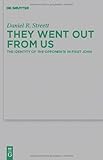About the Series
This is part 4 in a series of posts laying out the problems with typical Koine Greek teaching methods and proposing a reformation in pedagogy. Part 1 talked about what it means to read Greek or any other language. Part 2 talked about the reality of what goes on in most traditional Greek teaching and testing. Part 3 argued that Greek professors, too, suffer from the ineffectiveness of the traditional method, and as a result are seriously lacking in their own grasp of Greek.
In this post, I want to argue that an oral/aural approach to Greek is necessary if we want to achieve true reading proficiency (as defined in part 1).
 The Four Skills
The Four Skills
All modern language teaching aims at cultivating proficiency in four skills: reading, writing, speaking and listening. Recent pedagogy has also stressed cultural knowledge as a key component of fluency.
Learning Your First Language
Now, when we think about how we learned our first language, it should be obvious that these skills do not emerge simultaneously, but that some in fact depend on others. Consider: From the time you were in the womb to about 1 yr old, you were listening, listening, listening. And, you eventually started comprehending and responding physically. Your mommy said, “No!” and you stopped trying to stick your finger in the outlet. Your daddy said, “Open wide!” and you opened your mouth to receive food. (This is the essence of TPR, by the way.) You were immersed in the language continuously, although only a
little was comprehensible to you.

Around 13-18 months, you started speaking. Just single words at first, but you knew what you were saying and they had meaning and corresponded to things. Of course, as you’re beginning to speak, you continue to be immersed in the language, listening all the time and comprehending more and more. In fact, all of your listening and comprehending is the basis for your speech production.
By the time you turned two, you probably had a passive vocabulary of 75-200 words and you were making sentences (2 or 3 word sentences). Or, if you were like me, you had just completed writing your first theological treatise on Hegelian metaphysics. J/k! ![]()
Then, you learn to ask, “What’s that?” and your active and passive vocabulary just skyrockets. You’re starting to map your world in the language. And, of course, you continue to be immersed in the language and receive continuous feedback.
Reading and Writing
Reading is the next skill to develop. Around 3, you could probably read single words, and by 5-6 you were reading short sentences and stories. By 6-7, you were actually using writing to communicate (as opposed to just putting letters on a page).
The Oral/Aural Basis
Think about what starting to read entails. You have been immersed in the language for 4-5 years, listening and speaking continuously. Then, you learn to convert marks on a page into sounds. But pronouncing words is not reading! Reading involves recognizing the words that you have pronounced. That is, reading is a form of hearing. Even adults read this way, by subvocalizing (i.e. vocalizing the words silently  in their mind; speed reading approaches attempt to eliminate this). True reading is only possible when the words you’re reading have already been acquired through hearing and speaking them! This is the oral/aural basis for reading, and it’s why Johnny Seminarian can’t read Greek for pleasure or with any meaningful level of fluency, and likely never will. You can’t read if you don’t already know the language, i.e. have it internalized. And you can’t internalize it apart from hearing it and speaking it (what about deaf people? see here).
in their mind; speed reading approaches attempt to eliminate this). True reading is only possible when the words you’re reading have already been acquired through hearing and speaking them! This is the oral/aural basis for reading, and it’s why Johnny Seminarian can’t read Greek for pleasure or with any meaningful level of fluency, and likely never will. You can’t read if you don’t already know the language, i.e. have it internalized. And you can’t internalize it apart from hearing it and speaking it (what about deaf people? see here).
The Reader’s Paradox
You may have heard of the hedonist’s paradox. Well, this is the reader’s paradox. When you seek to gain the ability to read only, you will never acquire it. It is only when you seek to learn the language (i.e. communicative proficiency) that you will find yourself able to read for pleasure and without the perpetual grinding that’s a sign of the end times.

White Jesus loves kids!
The Backwardness of Traditional Pedagogy
Now you can see how backwards traditional pedagogy is. Thinking we will take the shortcut, we try to teach you to read first. But, without the oral/aural foundation that brings internalization, you are stuck translating rather than reading. Truly I say unto you, unless you become like a little child and immerse yourself in listening to and speaking Greek, you will never enter the kingdom of reading. There is no shortcut to fluency.
Next Time
In the next post, we will look at advantages that adult language learners have over children, as well as how long it takes to acquire a language, and why this means we need to rethink our Greek curricula.





I have one minor caveat: I’m not sure that internalization is produced _only_ by a foundation of oral/aural skills. C.S. Lewis once wrote in a letter that he envied his brother’s ability to actually speak a foreign language, implying that he himself could speak none of the several languages he was able to read and in some cases write (Greek, Latin, French, Italian, Old English, and what Lewis called “schoolboy” German.) But Lewis is also the author of the famous passage in Surprised By Joy about “the great Rubicon” of language acquisition: bypassing one’s mother tongue and learning to think in the L2, which is precisely the goal to be accomplished by including speaking and listening in the ancient language classroom. And in fact Lewis read classical and modern foreign languages for pleasure. One key difference in the way he was taught, though, as opposed to modern interpretations of GTM, is that he was required to _write_ in Latin and Greek. So not all GTM students will fail to internalize any of the L2. But those that do, of course, are doing so in spite of the method and not because of it.
Stephen, I guess I’m skeptical about Lewis reading Greek for pleasure. Maybe you can provide some more sources for that claim? What he describes in Surprised By Joy is his professor doing an oral interlinear of sorts and then Lewis being required to respond in kind. I’m sure Lewis did begin to internalize many words, phrases, etc, through constant exposure, but it would truly be miraculous to develop any meaningful level of fluency from this, and Lewis would be a real exception!
See, for example, the Collected Letters of C.S. Lewis, vol.1, p. 764, where he writes to Owen Barfield about which Greek play they should read when Barfield comes to visit: “I haven’t read Aeschylus this long time but I don’t mind having a shot. The Prometheus is a bit easier than the Agamemnon.” On page 150 of the same volume we find certain evidence that Lewis was required to write Attic prose. Elsewhere, he also says that his ideal happiness would be “to read the Italian epic: to be always convalescent from some small illness and always seated in a window that overlooked the sea, there to read these poems eight hours of each happy day” (quoted in A. N. Wilson’s biography, p. 146). If you’re not convinced about the Greek, the case of Italian is sure: Lewis certainly wasn’t planning on sitting at a desk with a lexicon and grammar, hammering out a translation, as he read Tasso and Ariosto in his ideal happiness. He had internalized enough of the language that he could read it for pleasure, not translate it — and this without ever speaking it. We know that he didn’t speak any of his languages from this note to his brother Warnie on March 17th, 1940: “I envy you being able [. . .] to converse in a foreign language, and am always ashamed that I can’t” (Letters, vol. 2, p. 363).
The full quotation from Lewis in Surprised By Joy illustrates that he understood the futility of always translating and never reading: “The great gain was that I very soon became able to understand a great deal without (even mentally) translating it; I was beginning to think in Greek. That is the real Rubicon to cross in learning any language. Those in whom the Greek word lives only while they are hunting for it in the lexicon, and who then substitute the English word for it, are not reading Greek at all; they are only solving a puzzle. The very formula, “Naus means a ship,” is wrong. Naus and ship both mean a thing, they do not mean one another. Behind Naus, and behind navis or naca, we want to have a picture of a dark, slender mass with sail or oars, climbing the ridges, with no officious English word intruding.”
Granted, this result was achieved using a methodology that we both consider far from ideal. But the point is that internalization, at least enough for students to turn off the running L1 translation in their heads, can occur without teaching speaking and listening skills. Lewis did write Greek and Latin, of course; I’m not sure about French, Italian, or Old English.
Among scholars of his day, I’m not sure that Lewis was especially unique. Not many people learned as many languages as he did, but I think the serious students of Latin and Greek in nineteenth- and early twentieth-century Britain achieved similar results in those languages, at least. Rigorous prose composition requirements had a lot to do with that.
Please forgive this excessively long comment to explain a minor point. It’s only because I have to look so hard for something in your posts that I don’t completely agree with. 🙂
Daniel: First of all congrats on your dissertation getting published! Well deserved, my friend. I still have a copy of the manuscript you submitted for the defense that I had bound. Thank you for starting this amazing blog and providing this pedagogy. We talked about this last year and I have explored ways to master this method. Would you be willing to come up to Oklahoma for a weekend and introduce my students to this approach? I cannot pay you with anything other than praise, but it would be much appreciated. Call me.
Alan
Alan, gracias. Let’s talk about it at SBL, if you’ll be there. I’ve enjoyed reading your blog redivivus!
Pingback: BibleWorks for Rapid Reading, pt 2 (BibleWorks 9 Review) | καὶ τὰ λοιπά